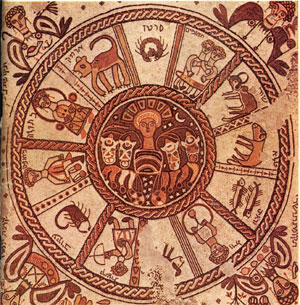I was originally going to link to this article and simply point out how ridiculous it was to suggest that Targum to Chronicles was from the sixth century BCE. Then I started reading more carefully the full article (the “targum” reference came up in a Google alert, hence I knew of that portion of the article before actually reading the entire thing). Wow! The publication is “The Trumpet” of the Philadelphia Church of God and continues the work of Herbert Armstrong and his “Plain Truth” newsletter. That was been a bit of a clue, sort of like limburger cheese. I ran into the Worldwide Church of God in college and it was my first exposure to the silly “British Israelism.”
 What kept me engaged with the article is that it concerns the calendar of the Bible, a topic to which I have recently returned in my research. Armstrong’s teachings were all focused upon his being able to accurately predict various world events based upon biblical prophecy and this included the assertion that the Christian churches had long lost the correct keeping of the festivals. But I am getting bogged down, I don’t really want to talk about Armstrong and his cult. I am more interested in the calendar.
What kept me engaged with the article is that it concerns the calendar of the Bible, a topic to which I have recently returned in my research. Armstrong’s teachings were all focused upon his being able to accurately predict various world events based upon biblical prophecy and this included the assertion that the Christian churches had long lost the correct keeping of the festivals. But I am getting bogged down, I don’t really want to talk about Armstrong and his cult. I am more interested in the calendar.
A month by any other name…
Years ago when I did my undergraduate thesis on the calendar in the Hebrew Bible I made two simple observations that are often overlooked. The first is that if you consider just the Pentateuch the months of the year are only ever referred to with ordinal numbers (e.g., “the second month”). The one apparent exception is the reference to “the month of Abib” in Exodus. Yet even here we do not actually find a proper name, rather it is descriptive.
היום אתם יצאים בחדש האביב׃
“Today, in the month of Abib, you are going out.”
So NRSV translates Ex. 13:4. But אָבִיב is “ripening barley” or the greening of the ears. Thus HALOT, “1. ears (of corn) already ripe, but still soft, to be eaten either crushed or roasted, … 2. month of the ears of corn, March-April.” Now this is not a particularly new observation, obviously, but what is often overlooked is that while the month is clearly named after the greening of the barley [mfn]British and European English refer to the greening or ripening of “corn.” As an undergrad it had to be pointed out to me that “corn” in British English is any grain, not the yellow and white monsters of grain that we eat during the summer months here in the US.[/mfn] it is not the month’s proper name.
Keeping time
The use of אָבִיב is merely and importantly descriptive. Remember, according to Ex. 12:2 God told Moses and Aaron that Abib (as “named” in the following chapter)
This month shall mark for you the beginning of months; it shall be the first month of the year for you.
Thus the importance of this month being referred to as Abib is that it marks the beginning of the year. That is to say, given that the calendar was a lunar calendar there needed to be some way to intercalate, to keep the calendar in sync with the seasons, otherwise the “first month” would move around the year. The Muslim calendar is such a calendar and so Ramadan, the mont of fasting, can be in any season. But the Hebrew calendar did not “move” in such a manner. In antiquity, how was it kept connected to the solar year?
The short answer is that we are not certain. The Bible does not appear to make any provisions for determining an embolismic year. In later times mathematical formulations are used, but in its most ancient state I suggest that the year was kept anchored to the seasons by the mere observations of the barley. Thus “the first month” would never occur any earlier or later than the greening of the barley and would remain firmly in the spring. [mfn]Interestingly enough, I find that Wikipedia makes note of the use of Abib for intercalation, but says that “citation is needed.” Once I get this article published someone can add it as the citation. ;-[/mfn]) Of course we know that at some point in the post-Babylonian era Rosh Hashanah was moved to the fall, in keeping with the dominant culture’s calendar. But within the Pentateuch the calendar began in the spring and it seems a far simpler and more practical method of intercalation was used.
Finally, while the Pentateuchal calendar is consistent in using ordinal numbers in naming the months, we do find that other month names are used in “later” passages. “Later” is in quotation marks because I refer primarily to those texts that come after the Pentateuch in the canon, but they also purport to be later in chronology. Thus we find in 1 Kings 6 and 8, where the building of the Temple is described with reference to Tyre as the source of timber, the use of Ziv, Bul, and Ethanim, Phoenician month names. And later we find Assyrian/Babylonian month names used as Judah comes in contact with those empires.
Does this consistency imply that the traditional ordering and dating of these texts is correct? Not to say that Moses wrote the Pentateuch, but that its origin predates exposure to Mesopotamian influences? Or were the redactors of not only the Pentateuch but Joshua, Judges, and 1-2 Kings extremely persistent in removing or disallowing any such anachronisms to appear in their stories?




2 thoughts on “The Hebrew Calendar (and silly use of Targum)”
Thanks for your thoughts about the Hebrew calendar. Because the Hebrew calendar is tied to both the sun and the moon (as you state in your article) it makes the months, festivals and seasons extremely predictable, thus making the Hebrew calendar the most accurate agricultural calendar in the world. Like you, I believe that in Biblical times Aviv was synchronized to the barley each year, until it later times the 7 times in 19 years cycle was developed. Thanks for a great post about the Hebrew calendar!